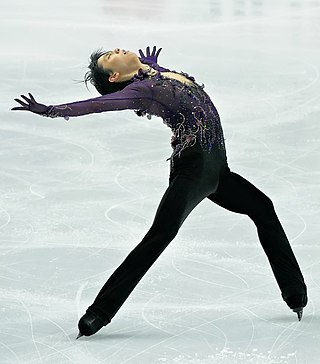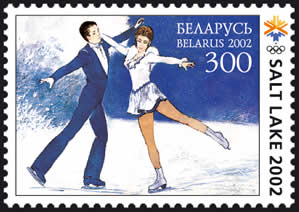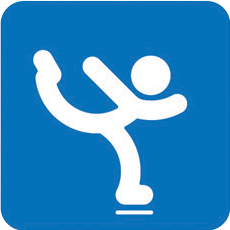Related Research Articles

Figure skating is a sport in which individuals, pairs, or groups perform on figure skates on ice. It was the first winter sport to be included in the Olympic Games, with its introduction occurring at the 1908 Olympics in London. The Olympic disciplines are men's singles, women's singles, pair skating, and ice dance; the four individual disciplines are also combined into a team event, which was first included in the Winter Olympics in 2014. The non-Olympic disciplines include synchronized skating, Theater on Ice, and four skating. From intermediate through senior-level competition, skaters generally perform two programs, which, depending on the discipline, may include spins, jumps, moves in the field, lifts, throw jumps, death spirals, and other elements or moves.

The 2002 Winter Olympics, officially the XIX Olympic Winter Games and commonly known as Salt Lake 2002, were an international winter multi-sport event that was held from February 8 to 24, 2002, in and around Salt Lake City, Utah, United States.

All figure skating events in 2002 Winter Olympics were held at the Salt Lake Ice Center.

Elena Viktorovna Berezhnaya is a Russian former pair skater. With partner Anton Sikharulidze, she is the 1998 and 1999 World champion, 1998 Olympic silver medalist and 2002 Olympic champion.

Jamie Rae Salé is a Canadian former competitive pair skater. With her former husband David Pelletier, she is the 2002 Olympic Champion and 2001 World Champion. The Olympic gold medals of Salé and Pelletier were shared with the Russian pair Elena Berezhnaya and Anton Sikharulidze after the 2002 Winter Olympics figure skating scandal.

David Jacques Pelletier is a Canadian pairs figure skater. With his former wife Jamie Salé, he was the co-gold medal winner at the 2002 Olympic Winter Games. They shared the gold medal with the Russian pair Elena Berezhnaya and Anton Sikharulidze after the 2002 Olympic Winter Games figure skating scandal.
The 2002 Winter Olympics, officially known as the XIX Olympic Winter Games, was a winter multi-sport event held in Salt Lake City, Utah, United States, from February 8 to 24, 2002. A total of 2,399 athletes from 77 National Olympic Committees (NOCs) participated in these Games, competing in 78 events in 15 sports and disciplines.

The figure skating events in 1998 Winter Olympics were held at the White Ring in Nagano. There were no changes in the format or scoring systems from 1994. Professionals were again allowed to compete, although they had to declare that intention and compete in ISU-approved events to do so. Previously, the ISU had been accused of rejecting Western professionals, while allowing Eastern Bloc state-sponsored "amateurs" to compete. Most of the top competitors by 1998 were now openly professional.

Anton Tarielyevich Sikharulidze is a Georgian-Russian former pair skater. With Elena Berezhnaya, he is the 1998 and 1999 World champion, 1998 Olympic silver medalist and 2002 Olympic champion.

Ekaterina "Katia" Alexandrovna Gordeeva is a Russian figure skater. With her late husband Sergei Grinkov, she is the 1988 and 1994 Olympic Champion, a four-time World Champion, a three-time European Champion, the 1990 Goodwill Games champion, 1987 Soviet champion, and 1994 Russian champion in pair skating. After Grinkov's death, Gordeeva continued performing as a singles skater.
Marie-Reine Le Gougne is a French figure skating official and competitor. She was a central figure in the 2002 Winter Olympics figure skating scandal.
The 6.0 system of judging figure skating was developed during the early days of the sport, when early international competitions consisted of only compulsory figures. Skaters performed each figure three times on each foot, for a total of six, which as writer Ellyn Kestnbaum states, "gave rise to the system of awarding marks based on a standard of 6.0 as perfection". It was used in competitive figure skating until 2004, when it was replaced by the ISU Judging System in international competitions, as a result of the 2002 Winter Olympics figure skating scandal. British ice dancers Jayne Torvill and Christopher Dean earned the most overall 6.0s in ice dance, Midori Ito from Japan has the most 6.0s in single skating, and Irina Rodnina from Russia, with two different partners, has the most 6.0s in pair skating.
Sally-Anne Martine Stapleford OBE is a British former figure skater and administrator, referee and judge. She is the 1965 European silver medalist. She represented Great Britain at the 1964 Winter Olympics and at the 1968 Winter Olympics, placing 11th both times.

Didier Gailhaguet is a French former figure skater, coach and official. He served as the president of the Fédération française des sports de glace (FFSG) from 1998 to 2004 and again from 2007 to 2020. He was suspended each time because of related scandals. At the peak of his power, he was one of figure skating's most influential and controversial officials, dubbed the "little Napoleon."

Figure skating at the 2010 Winter Olympics was held at the Pacific Coliseum in Vancouver, British Columbia, Canada. The events took place between 14 and 27 February 2010.

Figure skating at the 2014 Winter Olympics was held at the Iceberg Skating Palace in Sochi, Russia. The five events took place between 6–22 February 2014. For the first time at the Winter Olympics, a figure skating team event was held.

Brandon Michael Frazier is an American pair skater. With his skating partner, Alexa Knierim, he is the 2022 World champion, the 2023 World silver medalist, a 2022 Olympic gold medalist in the figure skating team event, the 2022 Grand Prix Final silver medalist, a two-time U.S. National champion, and a three-time Grand Prix gold medalist.
References
- 1 2 "'Meddling' Documentary Dives Into 2002 Olympic Figure Skating Scandal". Cheddar. Archived from the original on April 1, 2022. Retrieved March 12, 2023.
- ↑ Swift, E. M. (February 25, 2002). "Thorny Issue". Sports Illustrated. Archived from the original on March 12, 2023. Retrieved August 20, 2021.
- 1 2 Sandomir, Richard (February 19, 2002). "As the Story Unfolds, NBC Has the Biggest Part" . The New York Times. Archived from the original on April 16, 2017. Retrieved February 18, 2017.
- ↑ XIX Olympic Winter Games: Pairs Figure Skating. NBC Sports. February 11, 2002.
- ↑ "NBC commentators surprised, shocked by judges". ESPN.com. Associated Press. February 12, 2002. Archived from the original on November 12, 2014. Retrieved September 25, 2007.
- ↑ XIX Olympic Winter Games: Pairs Figure Skating. CBC Sports. February 11, 2002.
- ↑ Daigle, Katy (February 15, 2002). "Overblown Skating Controversy". Hartford Courant. Archived from the original on March 12, 2023. Retrieved March 12, 2023.
- 1 2 3 Jackson, Jon (January 2005). On Edge. Thunder's Mouth Press. p. 197. ISBN 1-56025-804-7.
- ↑ Sarkar, Pritha (February 9, 2014). "Americans unruffled by 'laughable' allegations". Reuters. Archived from the original on March 12, 2023. Retrieved March 12, 2023.
French judge Marie-Reine Le Gougne was banned after admitting she had been pressured to back the Russians in an arrangement that would also lead to French couple Marina Anissina and Gwendal Peizerat winning the ice dance.
- ↑ Hersh, Philip (August 6, 2002). "French skating judge insists she voted her conscience". Chicago Tribune. Archived from the original on March 12, 2023. Retrieved March 12, 2023.
"I don't want to comment on Mr. Rogge's decisions," Le Gougne said. "All I say is I put the Russians first because they were the best. "I voted with my conscience on February 11, 2002, and today I would make the same choice without hesitation."
- ↑ Thomas, June (February 14, 2002). "We wuz robbed". Slate. Archived from the original on March 7, 2008. Retrieved September 26, 2007.
- ↑ "No Defense for Bad Judgment". USA Today. February 13, 2002. Archived from the original on June 4, 2011. Retrieved April 21, 2010.
- ↑ "A Duo Deprived" . New York Times. February 13, 2002. Archived from the original on October 27, 2022. Retrieved March 12, 2023.
- ↑ "Skating on Thin Ice? It Figures" . Los Angeles Times. February 13, 2002. Archived from the original on January 4, 2013. Retrieved September 11, 2012.
- ↑ "Maybe the Russians really did win". Pasadena Star News. February 13, 2002.
- 1 2 Dixon, Robyn (February 16, 2002). "It's an Outrage to Russians". Los Angeles Times . Moscow. Archived from the original on September 4, 2020. Retrieved February 10, 2002.
- ↑ Nii, Jenifer K. (March 22, 2001). "Canadian pair wins audience, gold". Deseret News. Archived from the original on August 11, 2022. Retrieved August 11, 2022.
- ↑ MSNBC coverage of press conference, February 13, 2002
- ↑ XIX Olympic Winter Games. NBC Sports. February 13, 2002.
- ↑ "ISU Communication no. 1181: Sanctions Related to the 2002 Olympic Winter Games Pair skating event: Text of the decision of the ISU Council of April 30, 2002" (PDF). Archived from the original (PDF) on March 25, 2009. Retrieved November 4, 2007. (9.03 KiB)
- ↑ "Three-year Ban for Skating Judge". BBC News. April 30, 2002. Archived from the original on February 24, 2003. Retrieved April 21, 2010.
- ↑ Barr, John; Weinbaum, William (April 18, 2008). "Wanted man: 'Little Taiwanese' and his big role in an Olympics scandal". ESPN. Archived from the original on November 5, 2012. Retrieved July 9, 2010.
- ↑ "Archived copy". Archived from the original on January 23, 2022. Retrieved October 4, 2022.
{{cite web}}: CS1 maint: archived copy as title (link) - ↑ Butler, Nick (June 8, 2016). "ISU vote to abolish anonymous judging system in figure skating to 'increase transparency'". insidethegames. Archived from the original on March 25, 2019. Retrieved April 23, 2019.
- ↑ "Decisions of the Council on Eligibility" (PDF). International Skating Union. March 24, 2005. Archived (PDF) from the original on June 21, 2011. Retrieved January 27, 2010.
- ↑ "Additional ISU documents on the WSF founders eligibility hearings". International Skating Union. Archived from the original on October 14, 2009. Retrieved January 27, 2010.
- ↑ Pittman, Travis (February 15, 2022). "Four questions answered about Tara Lipinski and Johnny Weir". KUSA. Archived from the original on March 12, 2023. Retrieved March 12, 2023.
Lipinski and Kapostasy are co-executive producers for the documentary "Meddling," looking at the 2002 Salt Lake City Olympics pairs figure skating scandal.